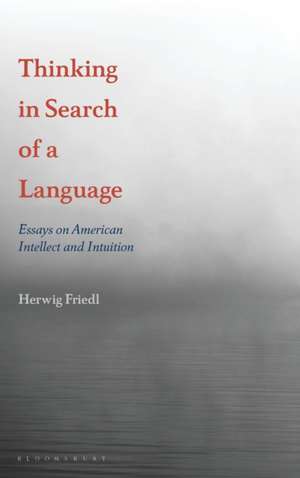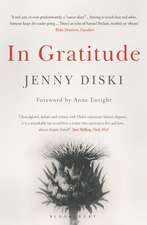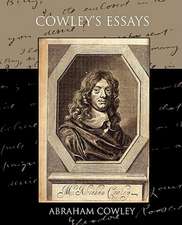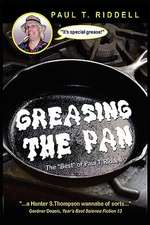Thinking in Search of a Language: Essays on American Intellect and Intuition
Autor Dr. Herwig Friedlen Limba Engleză Hardback – 19 sep 2018
Toate formatele și edițiile
| Toate formatele și edițiile | Preț | Express |
|---|---|---|
| Paperback (1) | 243.25 lei 3-5 săpt. | |
| Bloomsbury Publishing – 19 sep 2018 | 243.25 lei 3-5 săpt. | |
| Hardback (1) | 835.76 lei 6-8 săpt. | |
| Bloomsbury Publishing – 19 sep 2018 | 835.76 lei 6-8 săpt. |
Preț: 835.76 lei
Preț vechi: 1067.88 lei
-22% Nou
Puncte Express: 1254
Preț estimativ în valută:
160.06€ • 164.91$ • 134.08£
160.06€ • 164.91$ • 134.08£
Carte tipărită la comandă
Livrare economică 24 februarie-10 martie
Preluare comenzi: 021 569.72.76
Specificații
ISBN-13: 9781501332715
ISBN-10: 1501332716
Pagini: 412
Dimensiuni: 152 x 229 x 30 mm
Greutate: 0.72 kg
Ediția:HPOD
Editura: Bloomsbury Publishing
Colecția Bloomsbury Academic
Locul publicării:New York, United States
ISBN-10: 1501332716
Pagini: 412
Dimensiuni: 152 x 229 x 30 mm
Greutate: 0.72 kg
Ediția:HPOD
Editura: Bloomsbury Publishing
Colecția Bloomsbury Academic
Locul publicării:New York, United States
Caracteristici
Covers literature as well as philosophy and from Emerson and his influence to the main currents of 20th-century American literature and thought
Notă biografică
Herwig Friedl is Professor Emeritus of American Literature and History of Ideas at Heinrich-Heine-Universität Düsseldorf, Germany. His book publications include a study of Henry James' aesthetic theory and, as editor, essay collections on E.L. Doctorow, on women studies as cultural studies, and on gender and conceptions of space.
Cuprins
AcknowledgmentsIntroductionI. Philosophical Proteus: Varieties of Emerson's Thinking1. Emerson among the Presocratics2. Emerson; or, the Neopyrrhonist Skeptic3. Mysticism and Thinking4. Hosting Sa'di5. Resisting Hegel6. Nature / Poetry7. Transgressive Manners8. Nietzsche's Emerson9. Emerson's and Dewey's AmericaII. American Pragmatism: Thinking Modernism10. American Thinking Out of Bounds11. William James: Ontology and Imagery12. William James: Ontological Skepticism13. Kitaro Nishida and William James14. The Necessity of the Lost Middle Voice15. Polite Disagreements: James and Bergson16. Congruences and Divergences: James, Bergson, Dewey17. William James and Charles Taylor18. The NewIndex
Recenzii
Friedl has now brought these essays together in an impressive volume, arranging his work into a discerning case for Emerson's innovative philosophical influence, and providing a fresh analysis of the American pragmatists and their pre-linguistic turn in modern thinking.
Informed by Continental as well as American thought, these essays, shaped into a connected argument, provide a scholarly exploration of American philosophy and pragmatism . Overall this window into the conversation between European and American philosophers of experience is quite exhilarating. Orienting Emerson by his influence on Nietzsche and defending James against Charles Taylor provides the clearest indication of the author's intention of preferring a dynamic flux to static or traditional conclusions. Summing Up: Recommended.
Never has the importance of Emerson and William James to the modernization of philosophic thought been unfolded with greater subtlety, boldness, and erudition as in Herwig Friedl's Thinking in Search of a Language, the product of a scholarly lifetime of research by one of the leading interpreters of the interrelations between American and Continental traditions from Transcendentalism to Pragmatism.
Herwig Friedl's essays on American Transcendentalism and Pragmatism have long enjoyed cult status among insiders. Reading them cover to cover is no less than a revelation. In interpretations that are original, surprising, and strikingly lucid, he pursues the perennially shape-shifting force of Being as it runs through the thought of Ralph Waldo Emerson, William James, Emily Dickinson, John Dewey, John Cage, and many others. The American preoccupation with the new, he shows, grows out of an orientation to that undercurrent of existence that can be sensed but not spoken. As Friedl elucidates in comparative readings unmatched in breadth and detail, this is an orientation American writers share with kindred spirits across space and time, including the Presocratics, Sa'di, Nishida Kitaro, Friedrich Nietzsche, and Henri Bergson. Written over 35 years, yet comprising a remarkably coherent whole, Thinking in Search of a Language is the book readers devoted to American thought have been waiting for.
Herwig Friedl's collection, Thinking in Search of a Language: Essays on American Intellect and Intuition is the essential, indispensable companion to studying America's philosophical engagement as it begins with Ralph Waldo Emerson's crucial experiments in thinking and moves into William James's radical reconceiving of what we understand as "experience" in unfolding his variety of American pragmatism. Friedl, himself steeped from early on in the pre-Socratics and informed later by extended encounters with the teaching of Gadamer and Heidegger, guides us superbly with and in his exquisite sentences, précising instruments that disclose what we have always seen but never seen before. Reading the Introduction alone is an education in how to read, what to do. The chapters following are perfectly parsed into two sections that work together in the manner of a Renaissance diptych, each part, in this case, textured by detail and scrupulous scholarship in the foreground set against a sweeping survey of the landscape from which modernism evolved. Friedl's volume is a brilliant achievement!
Friedl's volume is the fruit of a career's worth of careful study and patient attention to what Emerson and [William] James made possible.
Informed by Continental as well as American thought, these essays, shaped into a connected argument, provide a scholarly exploration of American philosophy and pragmatism . Overall this window into the conversation between European and American philosophers of experience is quite exhilarating. Orienting Emerson by his influence on Nietzsche and defending James against Charles Taylor provides the clearest indication of the author's intention of preferring a dynamic flux to static or traditional conclusions. Summing Up: Recommended.
Never has the importance of Emerson and William James to the modernization of philosophic thought been unfolded with greater subtlety, boldness, and erudition as in Herwig Friedl's Thinking in Search of a Language, the product of a scholarly lifetime of research by one of the leading interpreters of the interrelations between American and Continental traditions from Transcendentalism to Pragmatism.
Herwig Friedl's essays on American Transcendentalism and Pragmatism have long enjoyed cult status among insiders. Reading them cover to cover is no less than a revelation. In interpretations that are original, surprising, and strikingly lucid, he pursues the perennially shape-shifting force of Being as it runs through the thought of Ralph Waldo Emerson, William James, Emily Dickinson, John Dewey, John Cage, and many others. The American preoccupation with the new, he shows, grows out of an orientation to that undercurrent of existence that can be sensed but not spoken. As Friedl elucidates in comparative readings unmatched in breadth and detail, this is an orientation American writers share with kindred spirits across space and time, including the Presocratics, Sa'di, Nishida Kitaro, Friedrich Nietzsche, and Henri Bergson. Written over 35 years, yet comprising a remarkably coherent whole, Thinking in Search of a Language is the book readers devoted to American thought have been waiting for.
Herwig Friedl's collection, Thinking in Search of a Language: Essays on American Intellect and Intuition is the essential, indispensable companion to studying America's philosophical engagement as it begins with Ralph Waldo Emerson's crucial experiments in thinking and moves into William James's radical reconceiving of what we understand as "experience" in unfolding his variety of American pragmatism. Friedl, himself steeped from early on in the pre-Socratics and informed later by extended encounters with the teaching of Gadamer and Heidegger, guides us superbly with and in his exquisite sentences, précising instruments that disclose what we have always seen but never seen before. Reading the Introduction alone is an education in how to read, what to do. The chapters following are perfectly parsed into two sections that work together in the manner of a Renaissance diptych, each part, in this case, textured by detail and scrupulous scholarship in the foreground set against a sweeping survey of the landscape from which modernism evolved. Friedl's volume is a brilliant achievement!
Friedl's volume is the fruit of a career's worth of careful study and patient attention to what Emerson and [William] James made possible.












